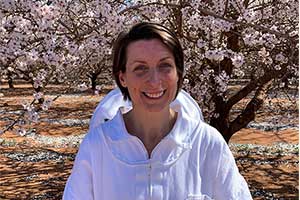Biosecurity insights from bananas to bees
The third Biosecurity Extension meeting was held online on 26 October 2021.
Fifty extension practitioners working across plant and honeybee industries, met to hear insights from the Queensland incursion of Panama disease tropical race 4 (TR4) and to experience the world of bee biosecurity, from the perspective of a bee biosecurity officer.
The Biosecurity Extension Community has been created to share experiences and insights from across our plant industries on
- tools and techniques to achieve better plant biosecurity for our industries
- building biosecurity into business sustainability
- new RD&E occurring around the country to support biosecurity
Panama Disease TR4
Jim Pekin, CEO from the Australian Banana Grower’s Council, spoke about the challenges of controlling the damaging soil-borne fungal disease, TR4. Panama TR4 can be spread through a different means, including
- movement in infected planting material
- movement in contaminated soil and water
- by people moving dirty vehicles, machinery, tools and footwear that have been on infested properties
- from parent banana plants to suckers
- feral pigs
There is no practical way to detect Panama TR4 in banana plants until external symptoms are showing. Good on-farm biosecurity measures are critical to not only protect banana farms from Panama TR4 but to also contain the disease if detected.
Jim emphasised the importance of a strong partnership between the banana industry and the Queensland Government in monitoring for the disease and protecting uninfected properties.
After six years since the first infection, the banana industry is working on a Transition to Management (T2M) program which will come into effect by 2023 (see process below). This transition will require the continued vigilance and biosecurity leadership within industry.
Jim concluded that protecting the banana industry from a TR4 infection is not only protecting the growers’ livelihood, but it is also protecting the industry as an asset to the wider community.
Honeybee Biosecurity
Ally Driessen, Biosecurity Officer, AgVictoria, spoke about the National Bee Biosecurity Program and described highlights of her role.
Key to creating biosecurity awareness for commercial and hobbyist beekeepers is finding the right channel of communication – ‘there is no one size that fits all’.
Ally is clearly passionate about supporting the beekeeping industry through her role as a bee biosecurity officer. Central to her work is communicating the importance of the beekeeping code, record keeping and hive checks for important pests and disease such as Varroa and American Foulbrood.

